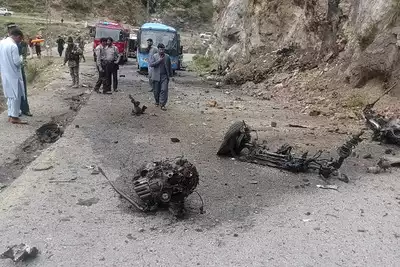Pakistan’s security crisis: China stops construction on two dam projects after a fatal assault on engineers
Chinese contractors have put an anticipated halt to work on Pakistan’s Dasu and Diamer Bhasha dam projects in response to growing security concerns. last decision was made in the wake of a horrific event that occurred last week in which a suicide bomber struck a car that was transporting a Pakistani driver and Chinese engineers, killing six people. The projects that have been put on hold highlight the hazards that the 1,250 Chinese nationals who work on these projects confront.

Why it is important
With significant investments made via the Belt and Road Initiative, China, Pakistan’s most steadfast regional partner, has been instrumental in the country’s economic growth.
Chinese people working on infrastructure projects in Pakistan are now more concerned about their security as a result of the incident.
China prioritises the protection of its people above all else, and any damage done to them stretches ties between the two countries.
These big infrastructure projects have been put on hold, which highlights a crucial point in Pakistan-China ties.
These attacks could have an effect on the regional projects funded by the Belt and Road Initiative.
Pakistan attributes it to Afghanistan.
Khawaja Asif, Pakistan’s minister of defence, has expressed worry over Afghanistan’s slow progress in stopping terrorism within its borders. He emphasised that in order to reduce the threats to Pakistan, the Taliban leadership needed to impose stricter border controls.
Asif said on X that “a fundamental change in the border situation is necessary in light of the increase in terrorist incidents.” Afghanistan is the root of terrorism in Pakistan, and Kabul is not moving in the right direction in spite of our best efforts.”
Pakistan has lately been the subject of many terrorist attacks, some of which it has blamed on the Afghan Taliban’s affiliate, Tehreek-e-Taliban Pakistan (TTP). Asif, who is aware of terrorist safe havens, expressed his dissatisfaction with the Taliban government’s inactivity to the Dawn newspaper. He said, “Cooperation from Kabul (for tackling the terrorism threat) is not available.”
The overall image
As part of its massive Belt and Road Initiative, China is investing in Pakistan with the goal of boosting economic growth and regional connectivity.
However, there are now grave worries about both the security of Chinese nationals employed on these projects and their safety due to the ongoing assaults on them in Pakistan.
In addition to putting pressure on the Pakistan-China alliance, these episodes raise concerns about the feasibility and sustainability of further investments in the area.
What they’re expressing
Following the incident, the Chinese enterprises involved made it apparent that they wanted revised security measures from the Pakistani government, suggesting that they could be reevaluating their business dealings there.
An AFP reporter was informed by a top interior department official in Khyber Pakhtunkhwa that “they have demanded new security plans from the government.” “Around 750 Chinese engineers are engaged in the Dasu Dam project, while 500 are working on the Diamer Bhasha Dam,” he said.
The seriousness and urgency of the crisis are reflected in high-level diplomatic interactions, such as the condolences and assurances sent to the Chinese embassy by Pakistani Prime Minister Shehbaz Sharif and other officials. The vital importance of this demand is highlighted by the Chinese Foreign Ministry, which is demanding “effective measures” to safeguard its citizens.
In between the lines
The events’ wider ramifications reflect fundamental conflicts in Pakistan over the fair allocation of gains from Chinese investments.
Concerns over the distribution of jobs and the creation of wealth have been expressed by Pakistani residents, highlighting the need for more equitable development policies. The assaults also underscore the intricacies of regional security, with the danger picture being exacerbated by Afghanistan’s alleged involvement in providing sanctuary to extremists.
This complex situation necessitates a multipronged strategy that combines diplomatic and community engagement tactics with national security measures to create a more secure and cooperative atmosphere for foreign investments in Pakistan.
What comes next?
In order to rectify the security failures that have resulted in similar tragedies, Pakistan today confronts a critical test. The government’s capacity to design and carry out strong security measures will be essential to both restarting the projects that have been put on hold and guaranteeing the safety of foreign nationals.
In order to combat the risks presented by terrorists hostile to foreign presence and influence in Pakistan, this involves possible revisions to security regulations as well as heightened intelligence and military operations.







